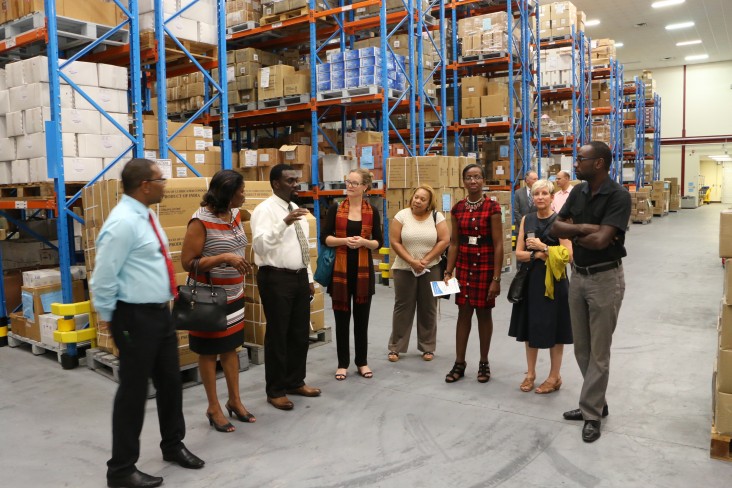
For Immediate Release
Guyanese who are living with HIV and AIDS now have universal access to anti-retroviral drugs and other key HIV/AIDS health commodities, thanks to a 10-year United States Agency for International Development (USAID)-supported Supply Chain Management System (SCMS) project which was officially closed out on September 30,2016.
Through the SCMS project, anti-retrovirals were procured for over 4,500 HIV patients; over 1,000 Ministry of Public Health staff members were trained in pharmaceutical procurement and standard treatment guidelines were developed and implemented to reduce wastage. Among the more tangible project outcomes is a state-of-the-art 26, 951 square meter Supply Chain Management Warehouse Complex, located on the East Bank of the Demerara River.
The warehouse was officially handed over to Government during the Project Close-out.
A total of 895 persons, including 68 children, were also provided with care and support services to improve their quality of life.
Word of these successes came as United States Ambassador Perry Holloway addressed a close out ceremony for theUS$26.2 million project at the Supply Chain Management Complex, in Diamond, East Bank Demerara. He told the gathering, which included high-level US Government officials, Public Health Minister Dr. George Norton and other Government, NGO and International representatives: “After 10 years of investing in public health supply chain management, the impact is truly transformative.” The project, which commenced in May 2006; supports the strengthening of the Ministry of Public Health’s in-country supply chain in order to provide reliable, cost-effective and secure supply of products for Guyana’s National HIV/AIDS program.
Deeming it an honor to represent the US Government at the event which brought a close to the “landmark program,” Ambassador Holloway explained that the SCMS, which was part of the largest ever health supply chain in the world, “focused on saving lives by aggressively scaling up treatment access, promoting country ownership and investing in sustainable country health systems.” The global project was launched in 2005 by the US Government, through USAID and funded by the President’s Emergency Plan for AIDS Relief (PEPFAR). It supports HIV/AIDS programs in PEPFAR-supported countries, in an effort to ensure universal access to treatment for persons living with HIV and AIDS.
“Through the SCMS, the Ministry received approximately $26.2 million in assistance to strengthen its supply chain, including capacity development and ensuring the availability of antiretroviral medicines and other key HIV/AIDS health commodities. Of the total investment, approximately $17.7 million was for technical assistance to build systems and capacity in all supply chain areas. An additional $8.5 million procured anti-retroviral medicines and other HIV related commodities, including $1.5 million to realize the establishment of the building where we are gathered today,” he said, noting that the project “brought to fruition the dream of a pharmaceutical-grade warehouse for medicines and other health commodities.”
“This pharmaceutical grade warehouse is outfitted with an electronic warehouse management system and improves supply planning and procurement of HIV/AIDS medicines and test kits to support national HIV/AIDS and other programs. Significant capacity development efforts accompanied each intervention to ensure that the Ministry of Public Health has the ability to sustain the new systems,” he added.
In closing, Ambassador Holloway noted that even as the SCMS project ends, the US Government recognized that there was still much to be done to strengthen the supply chain. With Guyana moving toward implementing ‘Test and Treat’ – which entails the treating of all HIV positive persons upon diagnosis – he maintained that this would require a “robust supply chain to support successful implementation.” To this end, the US envoy pledged the US Government’s continued support in the form of a new Procurement and Supply Management project which is part of its continuing Global Health Supply Chain Strategy.







Comment
Make a general inquiry or suggest an improvement.